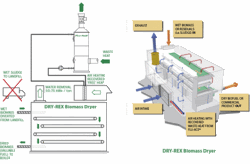Thermal Energy opens DRY-REX test facility to study drying of biomass; receives first contract
 Thermal Energy today announced that it has established a DRY-REX test facility to handle funded research projects on drying different sources of biomass for use as biofuels. The laboratory in Chilliwack, British Columbia, Canada, is under the supervision of the Thermal Energy's Chief Scientist Dr. Raymond Belanger.
Thermal Energy today announced that it has established a DRY-REX test facility to handle funded research projects on drying different sources of biomass for use as biofuels. The laboratory in Chilliwack, British Columbia, Canada, is under the supervision of the Thermal Energy's Chief Scientist Dr. Raymond Belanger.It test facility already received its first contract from an Italian firm to conduct drying tests on grape pressings and orange pressings. This is one of several requests from potential customers in Europe's bioenergy sector seeking to determine the viability of the DRY-REX(TM) low temperature biomass dryer at their sites.
With all fossil fuels increasing in price at the same time as demand grows for eco-friendly alternatives, more and more manufacturers and producers are realizing their waste has the potential to become valuable biofuels. Our new lab provides a cost-effective way for them to determine the viability of converting their biomass for this use or for as a secondary commercial product. - Tim Angus, President and CEO of Thermal EnergyThe new lab also acts as a catalyst for selling DRY-REX technology to help customers achieve their goals. The low operating temperatures of the DRY-REX technology minimize the amount of volatile organic compounds (VOCs) generated from biomass and the risk of fires and explosions which can occur with high temperature systems. Where high temperature systems require burning of fossil fuels, DRY-REX can safely and easily utilize the waste heat generated from a variety of industrial and commercial processes.
The DRY-REX technology (schematic, click to enlarge) thermally treats wet biomass for bioenergy, with the following results:
- Increased biomass dryness to 65% or higher;
- Increase heating value of biomass;
- Reduced boiler combustion air requirements;
- Improved boiler combustion efficiency by 20% or more;
- Increased biomass combustion rates by up to 30%;
- Reduced or eliminated supplementary non-renewable fossil fuel combustion;
- Reduced greenhouse gas emissions
- Converts waste such as sludge into valuable, high-yield biofuels,
- Replaces or displaces costly fossil fuels (oil, gas, etc) with dried residuals;
- Eliminates environmental impact of landfilling waste;
- Eliminates related environmental costs: transportation; landfill remediation, opening, closing & maintenance costs; long term environmental liabilities.
- Eliminates landfill emissions.
 energy :: sustainability :: bioenergy :: biofuels :: biogas :: biohydrogen :: biomass :: co-firing :: drying :: waste :: opportunity fuels ::
energy :: sustainability :: bioenergy :: biofuels :: biogas :: biohydrogen :: biomass :: co-firing :: drying :: waste :: opportunity fuels :: Thermal Energy has received a number of inquiries from across North America and Europe for a variety of drying needs. These include drying waste streams such as wood fuel, industrial and municipal sewage sludge, food and beverage waste, and other materials for use as biofuels and solid biomass.
Thermal Energy has also received inquiries from ethanol producers looking to dry their distillers grain. Distillers grain is often used as feed for livestock. On average, for every bushel of corn used for ethanol, producers get 11 litres of ethanol and 7 kilograms of distillers grains.
The lab is equipped with a gravimetric moisture analyzer to determine the concentration of moisture and solids before and after testing. It will also be equipped with a calorimetric "bomb" - a device for measuring the calorific or heating values of dried waste products to determine their financial value as a fuel source.
Thermal Energy International Inc. is a technology company providing custom energy and emission reduction, and bioenergy solutions. Headquartered in Ottawa, Canada, TEI is a designer, design build developer, fabricator, owner, operator and supplier of proprietary and patented energy conservation, renewable energy and environmental technology solutions. Thermal Energy is a fully accredited professional engineering firm, and offers advanced process and applications engineering services. The company is a member of the Chicago Climate Exchange (CCX).
References:
Thermal Energy: Thermal Energy Opens DRY-REX™ Test Facility - March 06, 2008.
 --------------
--------------
 At the 148th Meeting of the OPEC Conference, the oil exporting cartel decided to leave its production level unchanged, sending crude prices spiralling to new records (above $104). OPEC "observed that the market is well-supplied, with current commercial oil stocks standing above their five-year average. The Conference further noted, with concern, that the current price environment does not reflect market fundamentals, as crude oil prices are being strongly influenced by the weakness in the US dollar, rising inflation and significant flow of funds into the commodities market."
At the 148th Meeting of the OPEC Conference, the oil exporting cartel decided to leave its production level unchanged, sending crude prices spiralling to new records (above $104). OPEC "observed that the market is well-supplied, with current commercial oil stocks standing above their five-year average. The Conference further noted, with concern, that the current price environment does not reflect market fundamentals, as crude oil prices are being strongly influenced by the weakness in the US dollar, rising inflation and significant flow of funds into the commodities market."









0 Comments:
Post a Comment
Links to this post:
Create a Link
<< Home